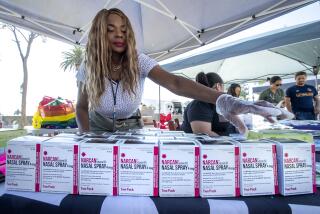2023 is already San Francisco’s deadliest year for drug overdoses

The year isn’t over, but San Francisco has already hit a grim milestone: 2023 is the deadliest on record for fatal drug overdoses.
More than 750 people died in accidental drug overdoses during the first 11 months of 2023, according to a report released this week from the city and county office of the chief medical examiner. That surpassed the 726 seen during the last recorded high, in 2020 — which was a horrific rise from the year before.
“We have seen record numbers of deaths due to overdose in San Francisco in 2023, or are likely to,” Hillary Kunins, director of behavioral and mental health at the San Francisco Department of Public Health, said at a press conference Thursday.
More than 80% of the overdose deaths in 2023 involved fentanyl, the data show. Black San Franciscans continued to make up a disproportionate share of the victims.
Even as state and local leaders have shifted their response to the growing drug crisis, focusing in recent months on increased law enforcement crackdowns, health officials remain dedicated to a multifaceted approach to saving lives.
This week, city officials announced a partnership with the National Institute of Drug Abuse that will test wastewater for certain drugs, including fentanyl, methamphetamine and cocaine, as well as naloxone, the opioid reversal medication most commonly known by its brand name, Narcan.
Gov. Gavin Newsom wants to target dealers trafficking in xylazine, a sedative only authorized for veterinary use, but frequently mixed with fentanyl and detected in overdose deaths.
“In an era when fentanyl is claiming lives at an unprecedented rate, we need all information available to us to give us a more complete picture and guide our response,” said Jeffrey Hom, director of population behavior health for the Public Health Department. He is hopeful the data will provide “a more complete picture of the trends in drug use ... allowing us to act faster when emerging substances, like xylazine, are increasing in the local drug supply.”
Xylazine, commonly known as “tranq,” has become a new concern for health officials and will be tested in wastewater under the program. The flesh-rotting drug has been linked to fatal overdoses in San Francisco and Los Angeles, and has sparked concerns that it could worsen the overdose crisis.
San Francisco officials reported that 30 of the overdose deaths so far in 2023 involved xylazine.
But fentanyl, the synthetic opioid that is 50 times more potent than heroin, continues to drive overdose deaths in San Francisco, a trend mirrored in Los Angeles and across the nation, in big cities and smaller metro areas.
A new report blames fentanyl for more fatal overdoses in L.A. County than methamphetamine for the first time in recent years. The opioid’s victims are disproportionately Black.
In San Francisco, Black people and those experiencing homelessness died at the highest rates from drug overdoses, the report found. Almost a third of the people who died of overdose this year were Black, although Black people make up only about 7% of the city’s population.
Similarly, almost 30% of those who died of overdose in San Francisco did not have a fixed address, the report found. Of those who did have an address, the highest percentage — 21% — lived in the Tenderloin, the neighborhood that has become ground zero for the city’s exploding homelessness crisis.
The 2023 spike comes after drug overdoses in San Francisco fell slightly in the previous two years. Analysis from the San Francisco Chronicle, which tracks the city’s overdoses, found that if current trends continue, another 68 deaths could be added to the count by the end of the year.
Public health officials say they plan to continue working to expand treatment options for people with substance-use disorders, including medication-assisted treatment, increased awareness and supplies of naloxone and exploration of innovative solutions, such as contingency management programs, to help people get — and stay — off deadly drugs.
More to Read
Sign up for Essential California
The most important California stories and recommendations in your inbox every morning.
You may occasionally receive promotional content from the Los Angeles Times.













